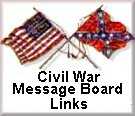For the Central Georgian.
To the Washington Rifles,
near Pensacola,
Florida.
“But few shall part where
many meet,
The
sand shall be their winding sheet,
And
every turf beneath their feet
Shall
prove a soldier’s sepulcher.”
Thinking perhaps it would be
interesting to you at camp to see something from home, I have concluded to
write you a short communication, to let you know that you are not forgotten by
us—notwithstanding I am aware of the fact, that nothing would be interesting
from my pen, but from the fact it is from Home.
Home? How many pleasant memories linger around the word.
It has been said that the three
sweetest words in the English language are, Mother, Home, and Heaven. No doubt all of you can realize more
fully the meaning of those words since you left Old Washington—the birthplace
of many of you, the adopted home of many others. You have forsaken friends, Home, and
many of the comforts and luxuries of life for the toils and hardships of peril
and camp life. You seem to be in great
danger; but put your trust in the God of Battles. “He will be with us in six troubles and in
the seventh He will not forsake us.”
We are rejoiced to hear you are
holding prayer-meetings. Neglect them
not; call upon God to assist you in all your undertakings. “If the Lord be for us, who can prevail
against us.” Pray for yourselves, and
the prayers of Mothers, Sisters, Pastor and Friends, (whose homes and rights
you have so gallantly gone forth to defend), will daily ascend the throne of
grace in your behalf—for the preservation of your lives and health, and to
spare us from the calamities of civil war—brother fighting against brother.
We would not call you back though
our heart-strings should burst asunder at parting. We will say, Go! And may the God of
our forefathers of the Revolutionary war go with you. We pray God that he will bring you safely
back to us: but if it is His will that you should fall “mid the clashing of
steel and the roar of cannon,” we feel confident that you, the “Washington
Rifles,” will never disgrace the honored name you represent, but will nobly
defend by “Wisdom, Justice, and Moderation,” the beautiful flag you bear, and never
suffer it to trail in the dust, or “Yield it to our country’s foes,” until
your very heart blood is spilled in its defence.
Rest assured that you will not be forgotten
by those you have left behind you. The
remembrance of your loved forms, and the happy hours we have spent in your
society, will ever be “green spots in our memories garden.”
We unhesitatingly place in your
keeping the honor of our noble Empire State, knowing you will defend the rights
of our country, even at the point of the bayonet.
In conclusion, we would say, we hope
and pray for your safe return to your “Mothers and Homes;” and if it is not the
will of God that you should return home, may we all meet in that eternal Home,
Heaven, where parting is unknown.
A DAUGHTER OF WASHINGTON.
.jpg)












